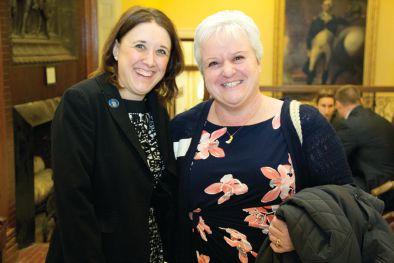
7 minute read
Stand Up for Students
from Maine Educator April 2016
by Maineea
A d v o c a c y Advocating for the Profession
Dozens of students, teachers and support staff took to the halls of the State House to send a clear message to those who make education policy decisions—put students, teaching and learning first. Several bills and funding decisions discussed in Augusta during the 127th legislative session will impact your work and how you educate your students. MEA members and their children worked to gain lawmaker approval for the MEA supported Stand Up for Students education funding initiative, a bill to increase starting teacher pay, and a measure to put a hold on tying testing to teacher evaluation. Member voices made an impact, and many lawmakers not only listened but followed through to support students with their votes.
STAND UP for Students
$157 MILLIoN REASoNS To VoTE YES
Teachers, Students, Parents and Businesses Prepare to Get out the Vote for School Funding Initiative, Ask for Lawmaker Support
In four short months, Maine Education Association members, a coalition of parents, community members, and business owners worked to gather enough signatures to place the Stand Up for Students education funding initiative on the November ballot. In March, the Secretary of State announced the initiative, which will provide $157 million more for public schools in the first year, with additional funding each year thereafter, had enough valid signatures to make the ballot. The MEA supported initiative will finally bring the State to the 55% funding level mandated by voters more than a decade ago. Members spoke with Phyllis Hunter (Washburn TA), Rep. Carol McElwee lawmakers in Augusta to ask for their support for (R-Caribou), and Lou Willey (UD 15 Director) with students from Caribou Schools the measure.

“Had this additional funding been in place in 2015, my school district would have received $1.1 million more in funding—that kind of money is game changing for students,” said teacher Ciara Hargrove, Waterville EA.
House Speaker Mark Eves (D-North Berwick) meets with students at the State House.
chance to help their students is a step in the right direction—especially in the face of chronic underfunding from the State.
“Learning the Stand Up for Students initiative will be on the November ballot gives me hope that in the coming years my students will get the opportunities they deserve, more support programs like Alternative Education and behavior programs, more resources in the classroom like current textbooks and instruments and supplies in our music and art classes,” added Hargrove.
The MEA supported Stand Up for Students ballot initiative will bring state funding back to the 2008 level and provide our schools the resources they need to give every child a quality education with equal opportunities, regardless of their zip code. To learn more about Stand Up for Students and volunteer to help the measure pass in November, log on to www.standupforstudentsmaine.org.
“I gathered signatures to put this education funding question on the ballot and it is a good day today knowing Mainers will get the chance to speak out, with their vote, in support of public schools.” - Ciara Hargrove, Waterville EA

TAKE THREE: PRoFICIENCYBASED DIPLoMAS
Another proposed change to the Proficiency-Based Diploma (PBD) system is making its way through the Legislature. This proposal would, once again, greatly impact teaching, learning and how you do your job, and has the potential to change the system your district may already have in place in order to meet this state mandate. While the MEA is supportive of proficiency-based learning, it does not support a proficiency-based diploma mandate, and has concerns with the bill that has recently passed out of the Education and Cultural Affairs Committee. MEA members shared concerns with lawmakers in hopes to change the legislation to the best possible alternative, understanding the diploma mandate is now Maine law.
The new bill, LD 1627, “An Act to Implement Certain Recommendations of the Maine Proficiency Education Council” would:
Change the requirement that students must be proficient in all 8 content areas to 4 content areas—English/Language Arts, Math, Social Studies, and Science and Technology. For the class of 2021, students must demonstrate proficiency in the state standards in the content areas listed above. For each graduating class thereafter, students must choose one additional content area per year until students are proficient in all 8 content areas by 2025.
A student who is a child with a disability, and is considered a special education student by law, may be awarded a high school diploma if that student meets proficiency levels as specified by the goals and objectives of the child’s individualized education plan. The individualized education program team shall determine the number of performance tasks that meet the student’s demonstration of proficiency in meeting the state standards.
The new proposed bill still requires educators to track proficiency in all eight content areas via the transcript, even though proficiency only needs to be demonstrated in four areas.
The new bill also states any rules regarding proficiency development by the Department of Education must give flexibility to local school districts and must “include guidelines and protocols to strengthen the capacity of school administrative units to ensure sufficient opportunity through multiple pathways for all students to achieve proficiency in meeting the state standards.”
While the revised bill addresses some of the concerns regarding the proficiency-based diploma mandate, particularly around the needs of special education students, the MEA still has reservations about the requirement, and its implementation in our schools. The MEA and many of its members have expressed concern students will be left behind, even with the new language in the bill. The change in the content area requirement, from eight to four, could result in schools narrowing the curriculum in an effort to focus on certain areas now being marked as needed to pass proficiency. Foreign language teachers, art, and music teachers have expressed concerns to MEA that their programs could be greatly reduced in an environment where Math, ELA, Social Studies and Science become the primary focus of graduation. The MEA will continue to focus on how this new change impacts students and teachers in each of our schools.
oN HoLD: TEACHER EVALUATIoN TIED To TESTING
The MEA worked hard to provide relief as the state rolled out a new standardized test to replace Smarter Balanced. With changes to the old No Child Left Behind, now known as ESSA, tying testing to your evaluation is no longer a mandatory requirement at the federal level. However, state law still requires student test scores on the Maine Educational Assessment in tested grades and subjects be a component of your teacher evaluation. The MEA worked to place a two year freeze on this requirement, meaning the DOE cannot force a district to use student growth and testing as a measurement of your evaluation. This moratorium begins in this school year and lasts through the 2016-2017 school year. The use of testing, if any, will be left up to local districts. In addition, the MEA worked to extend the teacher evaluation pilot year through the ’16-’17 school year. The MEA will continue to work to make standardized testing, tied to evaluation an optional, not mandatory component.

$40K THE FIRST DAY

The MEA believes teacher salaries are far behind where they should be, and it believes in elevating the profession by paying teachers a starting salary of $40,000. The current state mandated starting teacher salary is $30,000. The MEA supported and worked to garner legislative support for a bill that would create this $10,000 increase in state law, while also improving requirements for student teachers to give them more training time in the classroom while in college. Nearly 1/3 of all K-12 teachers are slated to retire in the next five to seven years, and the MEA believes in order to attract and retain good teachers we need to pay teachers a fair, living wage. The bill passed out Rep. Ellie Espling (R-New Gloucester) with of the Legislature’s Patty Scully (Winslow EA) Education and Cultural Affairs Committee, the MEA will continue to push for increased pay to make Maine a more attractive state for educators. The bill is awaiting a final vote in the Legislature.










